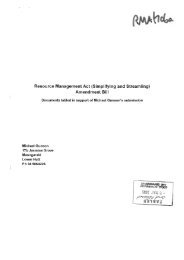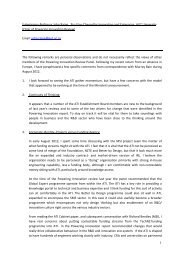Parliamentary Debates (Hansard) - New Zealand Parliament
Parliamentary Debates (Hansard) - New Zealand Parliament
Parliamentary Debates (Hansard) - New Zealand Parliament
Create successful ePaper yourself
Turn your PDF publications into a flip-book with our unique Google optimized e-Paper software.
3676 Local Government (Auckland Reorganisation) Bill 16 May 2009<br />
Hon David Cunliffe: The example given by the Leader of the House—about socalled<br />
trivial changes to dates, and so forth—is clearly distinct from proposals to add<br />
entirely new parts. I submit to you, Mr Chairperson, that the application of the word<br />
“trivial” to a part such as new Part 5, which the Committee is currently debating, is a<br />
gross insult to the communities affected, which are Māori, Pacific, and other ethnic<br />
groups. It is simply not appropriate that members of this Committee should describe<br />
mechanisms to ensure appropriate representation of that nature as “trivial”.<br />
That brings us, I guess, to the core point of what the Leader of the House submitted,<br />
which was that these parts are, in his view, no more than a filibuster and therefore do<br />
not deserve the protection of the Standing Orders. That brings into question the matter<br />
of whether the member’s perception of the part should stand for the whole Committee.<br />
Clearly, it should not, and new Part 5 should be seen as an example of an extremely<br />
substantive and well-thought-out part. Why is it necessary? That is the whole point—<br />
The CHAIRPERSON (Hon Rick Barker): The member is straying into the<br />
substance of the part. Let me make a number of points. Firstly, it is not helpful to have<br />
descriptors of what members do as being trivial, or this, that, or the other. A point of<br />
order is about order; it is not about the emotional words that one might wish to attach to<br />
it.<br />
Secondly, I make the point that no matter what members write on their<br />
amendments—whether they insert new parts, new multi-parts, and so on—they are still<br />
amendments. So according to the Standing Orders we are considering amendments, not<br />
parts. However, because they are amendments of such a nature, they will get a little<br />
more air time than they would if they were just one-word amendments, and that is<br />
reflected in the Chair’s consideration. I repeat for the Committee the point I made<br />
before, which is that the two Rs, which are relevance and repetition, will guide the<br />
Chairs’ decisions.<br />
The third point I make, again—and this will never change as long as we have this<br />
<strong>Parliament</strong>—is that the decision will be the Chair’s and the Chair’s alone. No<br />
correspondence will be entered into, and there will be no emails, no texts, no groans, no<br />
sighs, and no rolling of heads or eyes—that will all wash over the Chair, whose opinion<br />
is impartial. The Chair will determine the appropriate time for the Committee to<br />
consider an amendment.<br />
I also make another point, which I think is important and fundamental here. <strong>New</strong><br />
<strong>Zealand</strong> is a democracy. We argue and battle over words. This is a contest of words, and<br />
this is a contest of wills. It seems to me, in a way, that it is a little bit like Ogden Nash:<br />
when the going gets tough, the tough go shopping. He did not say that, but in this<br />
situation, when the going gets tough in the Committee, the tough write amendments or<br />
parts. That is what this is about; it is a wrestle. But at the end of the day we have to have<br />
the debate. It has to be relevant, cogent, and to the point, and repetition should not be<br />
entered into.<br />
Both sides will feel aggrieved and disappointed at some point—such is the role of the<br />
Chair. But we will make these decisions as we go, piece by piece. I state it again: it is<br />
the Chair’s decision—no correspondence will be entered into—and it is about relevance<br />
and repetition.<br />
HONE HARAWIRA: Tēnā koe, Mr Assistant Chairperson. Kia ora tātou katoa. If<br />
Labour’s proposal for Pasifika nation seats was genuinely about representation, then<br />
where are the seats for the Somali, the Kenyan, the Dalmatian, or the South African?<br />
Although I respect much of what Labour has had to say today, this proposal is nothing<br />
but a naked grab for the votes of the large Pasifika nation populations in Auckland.<br />
Although I have the greatest respect for my Pacific cousins, I note the fact that the<br />
phrase “sons of Māui”, attributed to George Hawkins, was actually one coined first by






![Full evidence text [PDF 8908k] - New Zealand Parliament](https://img.yumpu.com/14025494/1/184x260/full-evidence-text-pdf-8908k-new-zealand-parliament.jpg?quality=85)
![−3 JUN 2009 IRELEASED] - New Zealand Parliament](https://img.yumpu.com/12829724/1/185x260/3-jun-2009-ireleased-new-zealand-parliament.jpg?quality=85)
![Full paper text [PDF 3515k] - New Zealand Parliament](https://img.yumpu.com/11267192/1/184x260/full-paper-text-pdf-3515k-new-zealand-parliament.jpg?quality=85)


![Full evidence text [PDF 9k] - Parliament](https://img.yumpu.com/7938085/1/184x260/full-evidence-text-pdf-9k-parliament.jpg?quality=85)





